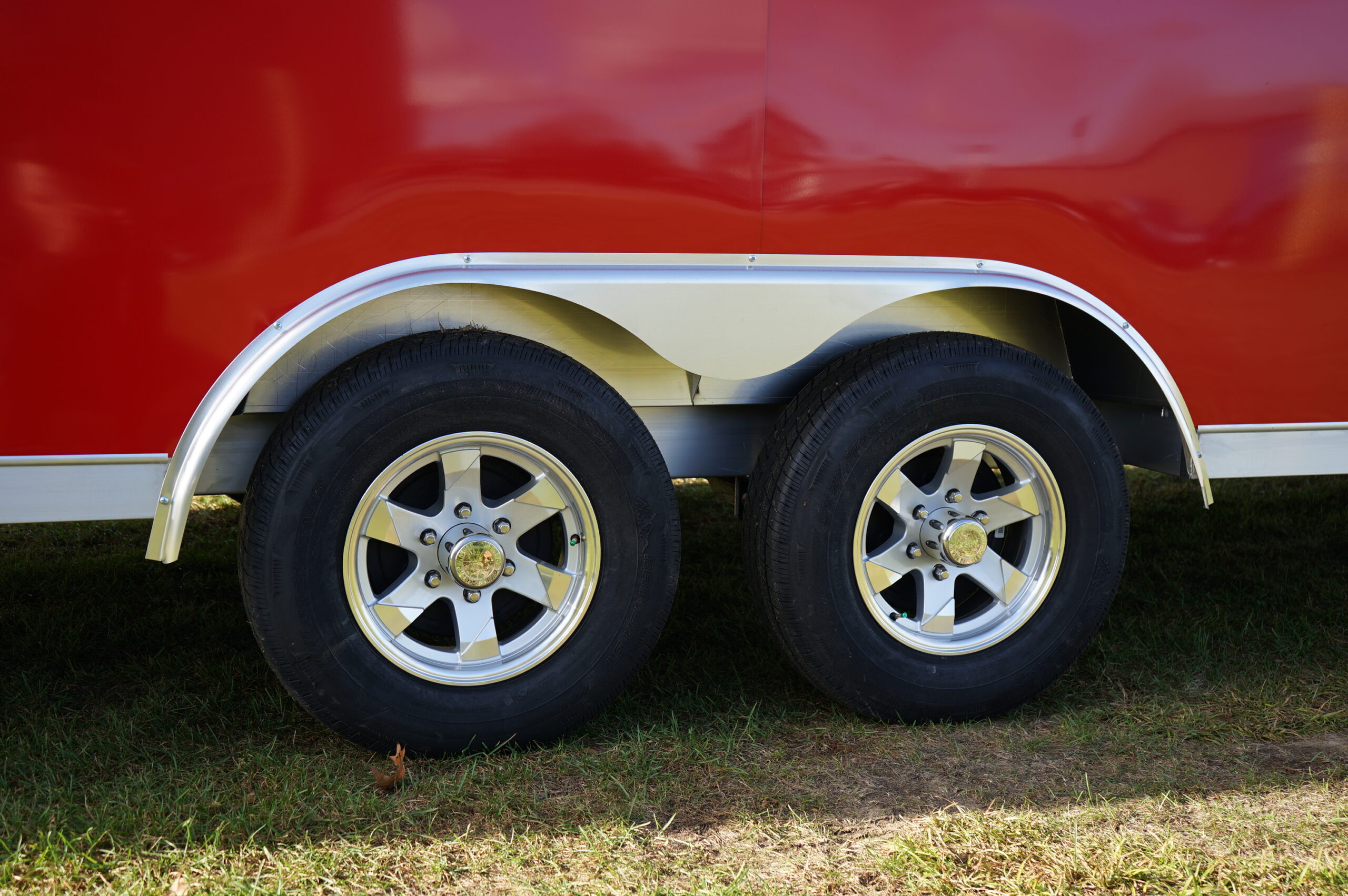7 Common Questions About Trailer Tires
Posted on March 23, 2023

Normally whatever knowledge we have regarding tires comes from dealing with our own personal vehicles, and this tends to generate some questions or doubts about enclosed trailer tires.
- Are enclosed trailer tires the same as passenger car tires?
- Do they require balancing?
- What is their lifetime?
If you’re upgrading to a larger tire, replacing a blown tire or trying to learn as much as you can, this article has the info you’ve been looking for!
Here you have the 7 most asked questions on Enclosed Trailer Tires:
What’s the Lifetime of an Enclosed Trailer Tire?
In Short: 3-6 years.
In Detail: Generally, you need to replace your tires every 3-6 years, however this varies for different tires. Tread wear is often not the main issue for enclosed trailers. Instead, the biggest issue these tires face is that they sit still doing nothing most of the time. They may stay parked in one spot when not being towed, in the receiving end of UV rays, getting flat spots, dry rotting, and deteriorating because of oxidation.
Even when stored in enclosed spaces, tires are likely to dry rot and suffer flat spotting. Even though they may look fine on the exterior, it’s best to replace them when getting close to 5-6 years old at most, or after running them for 10,000-12,000 miles.
How old are the trailer tires?
There’s an easy way to tell the age of your enclosed trailer tires: The Department of Transportation (DOT) identification number is stamped on the side of the tire. The code starts off with the letters “DOT”, followed by numbers or letters indicating the place of manufacture. The last four digits of the code indicate the week and year when the tire was manufactured. For example, the number 0418 = The 4th week of 2018.
Do Enclosed Trailer Tires Need to be Balanced for Good Performance?
In Short: No.
In Detail: You can have your trailer tires balanced if you’d like, but this isn’t a requirement. You are much likelier to feel the vibrations from unbalanced personal vehicle tires, so car tires are dynamically balanced to prevent this. Enclosed trailer tires serve the purpose of supporting a load at the back of a tow vehicle, not offering a smooth driving experience for passengers.
What is the Load Range on an Enclosed Trailer Tire?
In Short: Load range basically tells you the weight capacity of the tire
In Detail: The tire’s load range is rated with a letter: B, C, D, and so forth. A load range D tire has a higher weight capacity than a B rated tire of the same size, and so on.
Be aware that load range varies among tire sizes, for example:
175/80-13, load range B = 1,100 lb capacity
205/75-14, load range B = 1,430 lb capacity
So which load capacity do you need for your replacement? In most cases, you’d have to get a tire with a matching load capacity to the ones that came with the cargo trailer. If you wish to get tires with a higher weight capacity, take into account that other components of the cargo trailer also have a weight limit, such as the wheels and axles. This means that upgrading the tires to higher capacity tires doesn’t necessarily improve your cargo trailer’s load capacity, as you will always be constrained by the lowest rated part of it. Plus, higher capacity tires commonly cost extra.
Can I Use Enclosed Trailer Tires on My Vehicle/Vice Versa?
In Short: No (excluding Light truck tires).
The detailed answer: Special cargo trailer tires are made for a particular use—supporting the load and cornering forces of the trailer. Passenger tires are made with sidewalls with greater flexibility and are made with passenger comfort and steering in mind. Generally speaking, it’s a terrible idea to swap them. They were not made to perform the same.
There are a few exceptions however. Light truck tires are occasionally used on larger trailers and fifth wheels due to the stiffness of the sidewalls. Light truck tires are typically available locally, and at low-priced charges. Additionally they commonly have better speed rankings than Special enclosed trailer tires. If you decide to go with Light truck tires, make sure they are within your load weight capacity.
Usually, you will need to stick with special trailer tires for your cargo trailer.
Why Do My Enclosed Trailer Tires Keep Blowing Out?
In short: Probably due to a Human Mistake (Don’t worry, this happens)
The detailed answer: There are many reasons for tire failure. Here are some of the more common ones:
Excessive heat due to underinflation
Tire overload
Surpassing Max Speed (listed on the side of the tire)
Flat spots or sidewall rubbing (which can indicate clearance or braking problems)
Bent spindles (less likely, but still possible)
Besides checking psi with a tire pressure gauge or tire pressure monitoring system, a good way to tell if you’ve underinflated a tire is to look at its wear pattern. If you see uneven wear on the outer edges, the tire is probably underinflated. Similarly, if you see uneven wear in the center of it, it’s likely overinflated. When tires are properly inflated, they should wear evenly.
Why Are Trailer Tires Bias Ply?
In Short: Most of them aren’t
The detailed answer: There are two types of trailer tires: Bias tires and Radial tires. The main difference between both is the way they are built. The wires inside the bias ply tire run at a 32-degree angle to the direction of movement, while the radial tire cords run at a 90-degree angle, or across the tire from wheel lip to wheel lip.
So what does this represent for tire performance? Radial tires are more flexible, ensuring even ground contact, grip, stability and tread wear. Radials tend to run cooler than bias tires, and since cooler tires last longer, radial tires tend to last longer than bias tires. Radials used to be more expensive than their bias counterparts, but that has changed and both types are now around the same price. Radial tires are perfect for on-road use, making them a more popular choice for today’s cargo trailer.
So why should you buy a bias ply tire for your trailer? Bias tires have stiffer sidewalls, which is perfect for off-road use. Whichever type of ring you choose, remember that they are not supposed to be mixed. Mixing the two types in the same trailer can likely cause uneven wear and tracking issues.
How Can You Protect Enclosed Trailer Tires from Dry Rot?
In Short: Wrap them after using them!
There are a few steps you can take to keep your enclosed trailer tires healthy and strong. Dry rot is caused by excessive exposure to sunlight and heat, lack of use and underinflation. Use a wheel cover when not using the cargo trailer to protect against UV rays, water and dirt. Raise your tires or, if possible, park the trailer over plywood boards to keep the tires off the ground when you’re not towing it. Make sure they are properly inflated (use a tire pressure gauge or tire pressure monitoring system, even if it looks in good conditions) For long-term storage, it’s better to remove the rings and store them in a cool, dark place.



